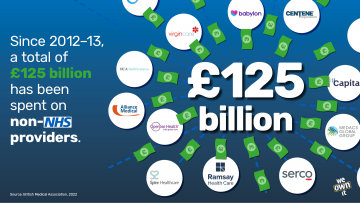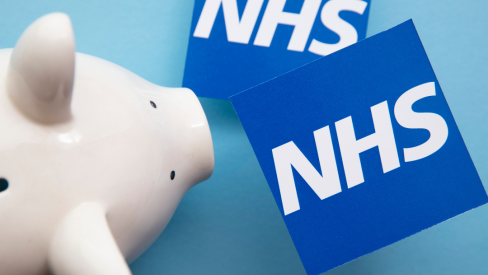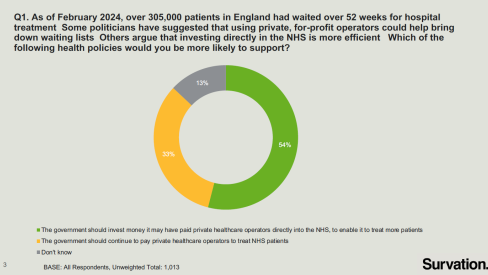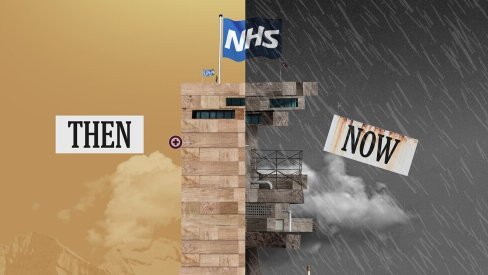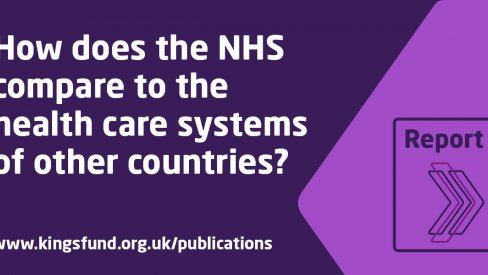reinstate our NHS
The founding principles of our NHS are that it is free at the point of use, funded through general taxation and available to all. If you get ill, have an accident, need an operation, or have a baby – the NHS is there for you. We all owe the NHS so much for looking after us during the COVID-19 pandemic - and NHS staff have made incredible sacrifices in order to save lives and reduce the spread of the virus.
The history
The NHS was founded in 1948, and has been proven to be one of the best and most efficient healthcare systems in the world – and unlike many others, it remains free at the point of delivery. The NHS was ranked the best healthcare system in the world according to a 2014 Commonwealth Fund study, and the second-cheapest of those analysed.
But recent governments have threatened the healthcare we all have access to, with cuts and privatisation.
In 1990, the “purchaser-provider” split was introduced as well as an internal market within the NHS. This separated the job of providing care from that of commissioning care. Initially, NHS Trusts were created to serve as the main providers, but more recent legislation would open the door wider to private companies being used to provide NHS services.
The 2012 Health and Social Care Act opened the door to rampant privatisation by requiring a competitive tendering process, involving for-profit private companies, for all NHS contracts over a certain value.
The 2022 Health and Care Act recognised the failure of that model. Part of the 2012 Act responsible for exploding outsourcing (Section 75) was revoked. However the 2022 Act still opened the door to private companies having seats on NHS decision-making bodies and being given NHS contracts without public scrutiny.
Who owns our NHS?
The vast majority of the NHS is still publicly owned and run. However, since the passage of the 2012 Health and Social Care Act, it is clear that there has been a trend in the direction of private healthcare companies running more NHS services.
Now, almost 10% of the NHS’s budget, by Labour’s estimate, over £100 billion in the decade to 2021, is spent with for-profit private companies. Within this figure, NHS trusts and foundation trusts' spending with Independent Sector Providers, including private for-profit (albeit not them exclusively), exploded by 559% in the decade to 2020 - 2021, according to the BMA.
We are also increasingly seeing the rise of private healthcare companies taking over NHS GP surgeries. Centene, a multinational US health insurance corporation, took over 49 GP surgeries in London in 2021. Added to the 21 NHS GP surgeries they previously owned, Centene is now the largest single provider of primary care in England.
NHS Trusts continue to pay for historic debts accrued because of Private Finance Initiatives (PFI). PFI was a policy of contracting private companies to build NHS hospitals at their own expense, with the NHS paying those companies back at rates much higher than they spent building the hospitals (plus interest) in yearly instalments. NHS Trusts paid out almost half a billion pounds in PFI debts in 2021 and are said to still owe around £50 billion in total.
In August 2023, the government announced the creation of 13 new Community Diagnostic Centres to reduce the NHS backlog, with over half of those (8) to be owned and run by private healthcare companies. This shows the government is intent on continuing to expand the role of the private sector in the NHS, instead of investing to build up the NHS's own capacity.
Only the NHS
NHS waiting lists currently stand at over 7 million people. The government and the Labour Party support a policy of sending NHS patients to private hospitals for surgeries.
We Own It published an open letter to the health leads of all parliamentary parties, signed by 15 public figures, including Stephen Fry, Dame Emma Thompson, and Siobhan McSweeney, making it clear that politicians have a choice to make — invest in our NHS for the long term OR divert that money to the private sector.
Private hospitals will not solve the crisis, because Only the NHS:
- Takes care of patients at A&E — the private sector doesn’t have A&E.
- Trains our doctors and nurses — the private sector relies on NHS-trained staff.
- Looks after all patients — the private sector cherry picks.
The real solution is to invest directly in the NHS to build up its capacity so that it can treat all patients.
Key facts
- 78% of us believe the NHS should be in public ownership, including 77% of 2019 Conservative voters and 85% each of 2019 Labour and Liberal Democrat voters.
- According to a briefing paper published by The Centre for Health and the Public Interest, it costs around £0.5m to train a doctor to the level of a consultant, and that there are an estimated 17,500 NHS consultants working privately in the UK. This means overseas investors are given access free of charge to a highly trained, expert workforce worth £8.5 billion - at our expense. Despite many calls for the private sedctor to contribute to these costs, these have so far been ignored.
- A recent Oxford University study published in Lancet Public Health has linked NHS privatisation to the preventable deaths of 557 people.
- A number of peer-reviewed academic studies (here and here for example) have found that hospitals cleaned by outsourced companies are dirtier and therefore cause more hospital-acquired infections.
- In just six years (2011-2017) private healthcare companies took out £831m in profits from our NHS just through one form of NHS outsourcing (PFI contracts and hospitals maintenance and support services).
- NHS privatisation leads to corruption. For example, companies were 10 times more likely to get Covid contracts if they knew a government minister, an MP or a government official.
- According to a 2021 analysis, more hip and knee replacement operations are now done by the private sector by Circle Health Group, Nuffield Health, HCA Healthcare and Spire Healthcare, than by the NHS. 18% of those operations were for the NHS through outsourcing contracts, and the remaining patients paid out of pocket or using private health insurance.
- Our NHS has seen real terms funding cuts in 2022 of between £4 and £9.3 billion, according to NHS Confederation.
- Underfunding of the NHS (the UK spends £40 billion less a year than comparable European countries) means waiting lists are longer than they should be and some people pay to go private if they can afford it.
- As a result of privatisation and underfunding, there are now 7.6 million people on NHS waiting lists, with hundreds of thousands now forced to pay for care out of pocket in the private sector or pay for private health insurance. This creates a two-tier system that undermines the universal support that our NHS enjoys and which prevents politicians from undermining it even more blatantly.
- We Own It works closely with several organisations whose work you can also get involved in: Keep our NHS Public, Toothless in England, the SOS NHS Coalition, 99% Org, Just Treatment, NHS Workers Say NO! and more.
"That’s the standard technique of privatisation: defund, make sure things don’t work, people get angry, you hand it over to private capital."
Noam Chomsky

